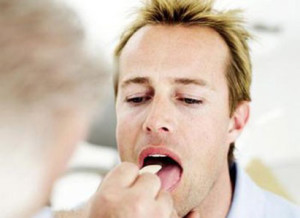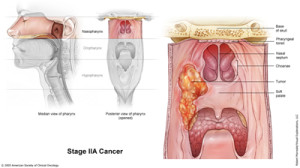This is the conclusion to a three part series: Part 1 | Part 2
I guess this section is not usually described in text books, as this part will be based more on my personal experience dealing with this illness. I’m sure more senior specialists have more to say, but I will just share what I have observed during my practice and I agree that we learn most about a disease by seeing patients. Not just about the disease itself, but more of what goes on beyond the the disease and patients inflicted, which you cannot learn from books.
After all that has been said- regarding diagnosis, investigation & treatment, we may still lose an NPC patient during any of the disease stage. Some of them may disappear after receiving the initial bad news. A number of them may be in the denial stage for longer period, and some, too long. Previously, we had a teenager who was diagnosed with NPC and he was adamant that he able to fight the disease alone. When your will is strong, it boosts your immune system and thus have the effect of killing cancer cells but that may be true in small tumours and for post-surgical cancer cases when the tumour bulk is low. Unfortunately, when this kid returned to us months later, the cancer had spread to his lung & liver and he succumbed mere days after.
In East Malaysia, it is not uncommon for NPC patients to come from the same village or they are closely related. As I have mentioned in Part 1, NPC has a strong genetic predilection. We have come across cases where the patients have strongly refused treatment, especially radiotherapy. They will tell us, “If we receive radiotherapy, we will die”. They got the notion, I believe, from the previous patients who have undergone similar treatment and did not survive. However, they do not realize that most of these patients come in late stage of NPC. No matter how we treat them, not all of them will have a good 5 year survival. This is one of the barriers that we are facing now.
Traditional medication and commercialized health products have seeped into our culture much better to some people compared to most, but I may be wrong. The problem is, our cancer patients place more trust on non-scientifically proven treatment compared to standard modern treatment. They still trust other products despite our advice that these products do not work and it is a waste of their hard earned money. In our clinic, it is very common for patients to request some time to think before starting conventional treatment, when actually they are trying out other treatment methods. We usually give them a week or two, but some will return months later with progression of disease (more severe) and some already with metastasis (advanced stage).
A point to ponder- what happened to noni juice, shark cartilage, spirulina, and other miracle wonder products of yesteryears? Just like a boy band with one hit wonder- you never hear a word of them nowadays. These so called health miracles were supposed to be the cure for all, but I guess only the company is smiling now after all the profits they have made. I do recall a lady admitted very pale and noted to have very low haemoglobin of 4.0 mg/dl. She was transfused with two pints of blood and looked better and so fresh upon discharged home. She was so cheerful, happy and was well while talking to me. However, at the end of the conversation, she thanked her son for giving her the spirulina which she claimed was the cure for her illness, instead of the blood transfusion. She still refused to accept the fact that she was feeling better because of the transfusion.
We have to acknowledge that the patient is only a segment of the disease. The family members play a major role, especially when the patient is frail. Without good family support, patients may discontinue the treatment. Sometimes, like a double edged sword, there are family members who against the modern treatment and influence patient’s mind with the non-conventional treatment options.
We have to bear in mind that the patient may not continue with the treatment if he or she is the sole breadwinner. I had a taxi driver who refused to stop working as there is no one to support his family if he started the treatment. As a reminder to ourselves, we need to treat the patient as a whole person, and not just his or her disease.
I do envy the people in West Malaysia, where they have many options for treatment. Last year in Sabah, there was only one radiotherapy machine, shared between government and private. There was a time when the machine broke down and our patients had to be transferred to other hospitals for further treatment. It was easier said than done. Firstly, the patients were not financially fit to travel to other states for about 2 months for treatment. Being far away with only a family member was not an ideal option when you are facing cancer. Secondly, some of the hospitals agreed, but the others were not able to accept them into their radiotherapy treatment. Either they were fully booked, or we were told to call another hospital. Our department faced great difficulty to explain to the patients that their treatment was about to be delayed in view of these problems.
As for the on-going radiotherapy patients, their treatment was stopped abruptly for almost a month. Significant delay resulted from difficulty in repairing an old overused machine and financial setback during that period. Currently, we are seeing residual tumours and recurrence in cancer in these patients who had a break in their radiotherapy. It does not take a genius to figure out that cancer cells will grow if treatment is halted midway.
Besides that, whatever you offer, it is the patients’ decision to accept the treatment planned. During my early years of practice, I was very insistent about pushing for cancer treatment in all patients. As time went by, I realized that we cannot force people if they refuse. Therefore, in my current practice, I will explain the treatment options for each patient. If they refuse, I will explain the outcome of disease and the ultimate painful death if left untreated. Most patients are adults, they can choose to live or die but as doctors there is also the burden of feeling unbearable guilt when you force someone into cancer treatment and they die because of it.
There is a new cancer centre in Kota Kinabalu but still lacking staff and facilities. I wish that there will soon be a vaccine, cure and better treatment in East Malaysia to combat this cancer. Let us hope this will be true by the time I retire.
Dr. Ahmad Nordin is an ENT surgeon currently working in Sabah. Find out more about him on The Team page.
[This article belongs to The Malaysian Medical Gazette. Any republication (online or offline) without written permission from The Malaysian Medical Gazette is prohibited.]


